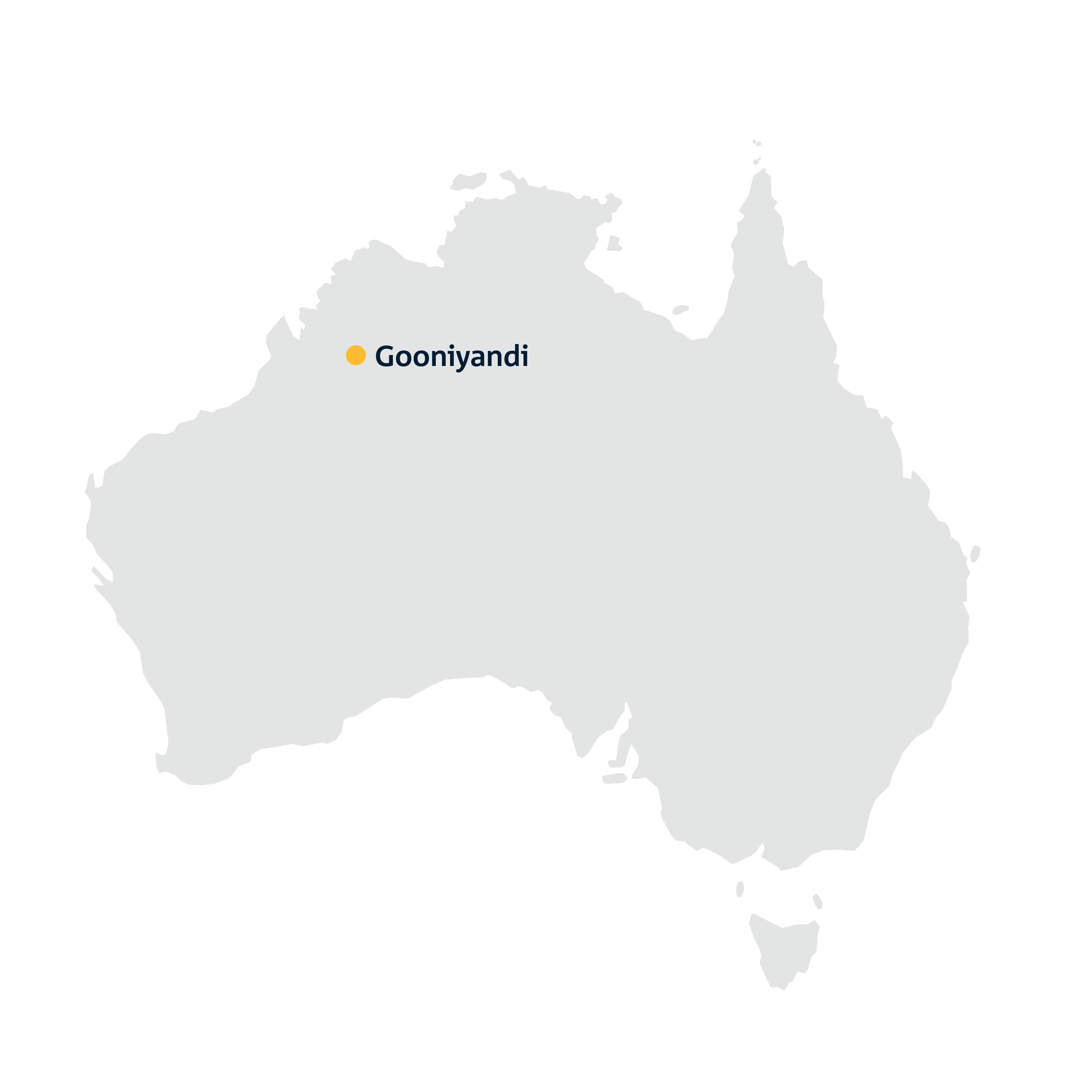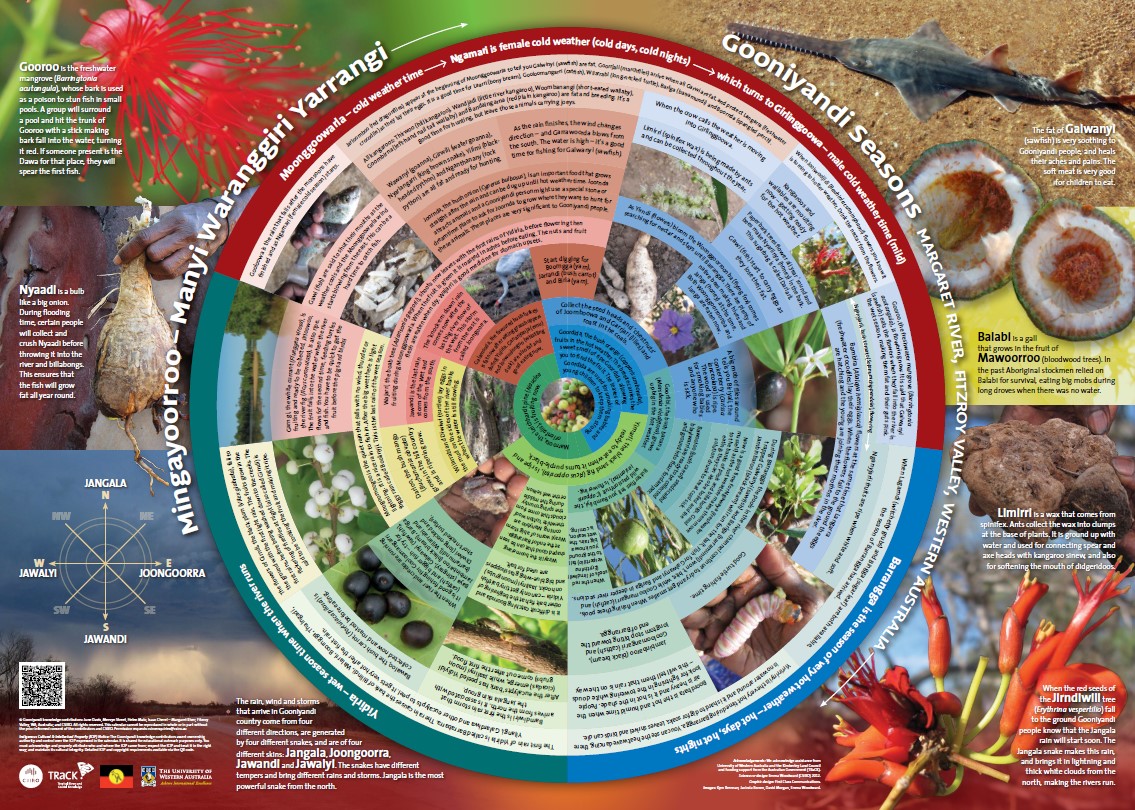 Mingayooroo – Manyi Waranggiri Yarrangi, the Gooniyandi seasons calendar, was developed by key knowledge-holders of the Gooniyandi language group from the Fitzroy Valley in the Kimberley region of Western Australia and CSIRO1.
Mingayooroo – Manyi Waranggiri Yarrangi, the Gooniyandi seasons calendar, was developed by key knowledge-holders of the Gooniyandi language group from the Fitzroy Valley in the Kimberley region of Western Australia and CSIRO1.
The Gooniyandi seasons calendar represents a wealth of Indigenous ecological knowledge. The development of the calendar was driven by a community desire to document seasonal-specific knowledge of the Margaret and Fitzroy Rivers in the Kimberley region, including the environmental indicators that act as cues for bush tucker collection.
The calendar also addresses community concern about the loss of traditional knowledge, as older people from the language group pass away and younger people are not being exposed to Indigenous ecological knowledge.
The calendar was developed as part of a Tropical Rivers and Coastal Knowledge project that sought to build understanding of Indigenous socio-economic values and rivers flows in northern Australia.
Gooniyandi seasons calendar

Gooniyandi seasons
The seasonal cycle recorded on the calendar follows four main seasons:
- Barranga (very hot weather time)
- Yidirla (wet season time when the river runs)
- Ngamari (female cold weather time)
- Girlinggoowa (male cold weather time).
Gooniyandi people closely follow meteorological events, including wind speed and direction, clouds and rain types, as each event is linked to different behaviours of animals. Gooniyandi people can therefore look to the weather to tell them when it is the best time for hunting and collecting different plants and animals.
Citation
- June Davis, Mervyn Street, Helen Malo, Isaac Cherel, Emma Woodward (CSIRO). 2011. Mingayooroo – Manyi Waranggiri Yarrangi. Gooniyandi Seasons (calendar), Margaret River, Fitzroy Valley, Western Australia. CSIRO (Land and Water).
Mingayooroo – Manyi Waranggiri Yarrangi, the Gooniyandi seasons calendar, was developed by key knowledge-holders of the Gooniyandi language group from the Fitzroy Valley in the Kimberley region of Western Australia and CSIRO1.
The Gooniyandi seasons calendar represents a wealth of Indigenous ecological knowledge. The development of the calendar was driven by a community desire to document seasonal-specific knowledge of the Margaret and Fitzroy Rivers in the Kimberley region, including the environmental indicators that act as cues for bush tucker collection.
The calendar also addresses community concern about the loss of traditional knowledge, as older people from the language group pass away and younger people are not being exposed to Indigenous ecological knowledge.
The calendar was developed as part of a Tropical Rivers and Coastal Knowledge project that sought to build understanding of Indigenous socio-economic values and rivers flows in northern Australia.
Gooniyandi seasons calendar
Gooniyandi seasons
The seasonal cycle recorded on the calendar follows four main seasons:
- Barranga (very hot weather time)
- Yidirla (wet season time when the river runs)
- Ngamari (female cold weather time)
- Girlinggoowa (male cold weather time).
Gooniyandi people closely follow meteorological events, including wind speed and direction, clouds and rain types, as each event is linked to different behaviours of animals. Gooniyandi people can therefore look to the weather to tell them when it is the best time for hunting and collecting different plants and animals.
Citation
- June Davis, Mervyn Street, Helen Malo, Isaac Cherel, Emma Woodward (CSIRO). 2011. Mingayooroo – Manyi Waranggiri Yarrangi. Gooniyandi Seasons (calendar), Margaret River, Fitzroy Valley, Western Australia. CSIRO (Land and Water).
